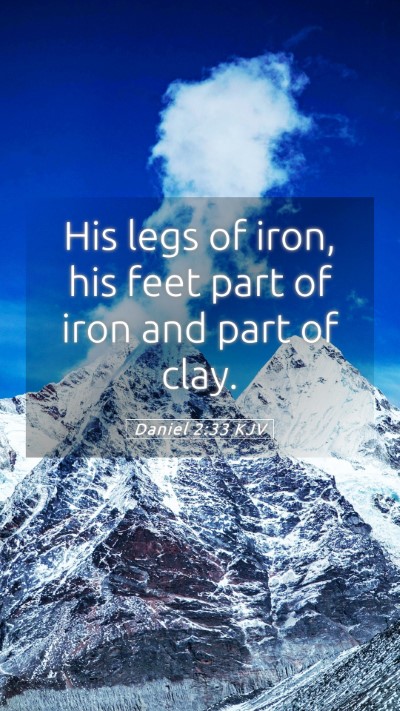Bible Verse Meaning: Daniel 2:33
Daniel 2:33 states: "His legs of iron, his feet part of iron and part of clay." This verse is part of the interpretation of King Nebuchadnezzar's dream, which is crucial in understanding the prophetic implications related to empires and the kingdom of God.
In this verse, we see the mention of different materials used to symbolize various kingdoms. The mixture of iron and clay indicates a kingdom that is strong yet fragile, hinting at the eventual division within the empire.
Commentary on Daniel 2:33
Insights from Matthew Henry
Matthew Henry emphasizes the significance of the dream as a revelation of God's sovereignty over earthly kingdoms. The iron represents the might of Babylon, while the clay suggests a lack of unity. Henry points out that the feet symbolize a coalition of forces that may appear powerful but are inherently unstable.
Insights from Albert Barnes
Albert Barnes expounds on the symbolic nature of iron and clay. He interprets the iron as a representation of strength, emphasizing the brutality and oppression associated with powerful regimes. Conversely, the clay reflects weakness and divisions, suggesting that the alliances of the last kingdom will not stand.
Insights from Adam Clarke
Adam Clarke takes a historical perspective, discussing the political ramifications of the described kingdoms. He notes that the iron legs identify with Rome, while the feet of iron and clay represent the eventual decline of this empire as diverse states and factions emerge, leading to instability.
Understanding the Symbolism
The mixture of iron and clay can be understood as the interaction between strength and vulnerability. Iron, a tough metal, represents forces of oppression, while the clay symbolizes human fragility and the inability to maintain unity. This symbolizes the inevitable disintegration of the final worldly empire, which cannot withstand God's ultimate rule.
Application of Daniel 2:33
To apply the lessons of this verse, readers are encouraged to reflect on the nature of worldly power versus divine authority. While empires rise and fall, it is God's everlasting kingdom that ultimately prevails. Believers can draw strength and hope knowing that despite tumultuous times, God's plans will not fail.
Bible Study Insights
For those engaging in Bible study, Daniel 2:33 offers profound insights into the prophetic timeline of earthly kingdoms. It encourages study groups to explore the historical context and to analyze how these principles apply today. Using bible study resources and bible study tools can enhance understanding.
Related Bible Cross References
- Daniel 2:34 - "You watched while a stone was cut out without hands..."
- Daniel 2:40 - "And the fourth kingdom shall be strong as iron..."
- Revelation 17:12-13 - "The ten horns which you saw are ten kings..."
- Isaiah 41:7 - "So the craftsman encouraged the goldsmith..."
Conclusion
This interpretation of Daniel 2:33 invites serious reflection on the nature of human governments and their transient nature. Believers are called to place their trust in the ultimate authority of God, who stands beyond time and earthly power. Understanding this verse within its wider narrative is essential for grasping the meaning of Bible verses and gaining wisdom from Scripture.


